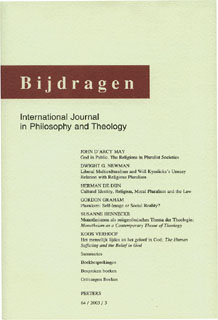next article in this issue  |

|
Document Details : Title: Göttliches Recht, menschliches Recht, Menschenrechte. Subtitle: Die Menschlichkeit des 'Ius Divinum' Author(s): MERKS, K.-W. Journal: Bijdragen Volume: 65 Issue: 3 Date: 2004-07-01 Pages: 257-282 DOI: 10.2143/BIJ.65.3.504969 Abstract : The text is the extended version of the lecture delivered at the occasion of the author’s farewell as Professor of Moral Theology at Tilburg Faculty of Theology. The tradition of canon law, dogmatics, and moral theology is familiar with the concept of “ius divinum”, divine right. This concept indicates that certain standards, orders and institutions can be seen as if having been set up by God himself. For example: the primacy of the Pope, the seven Sacraments, or, in moral theology, the standards of natural law. Because they do not encompass human institutions, man cannot abolish them. However, what does it mean in our present times to contend that God himself has instituted certain standards and institutions in our world, and that they are therefore beyond human authority? In this contribution the thesis is defended that the so-called divine right does not have to be considered a taboo but rather that it is thoroughly human. This in the dual significance of human: it is of human origin and it serves mankind, it is for the good of humanity. On the one hand, “divine right” is not only a phenomenon within the human world, but, more radically, a phenomenon from this human world, made by human beings themselves. On the other hand, such an anthropocentric vision does not indicate the end of a meaningful reference to God and of the understanding of human life in the countenance of God. To the contrary, the divine within a divine right finds its criterion in its very humanity, its humane kindness. With a short reference to the ethics of human rights, which tries to interweave the unconditional moral obligation and modern anthropocentrism, the search for traces of divine right in this world is brought to completion. |
